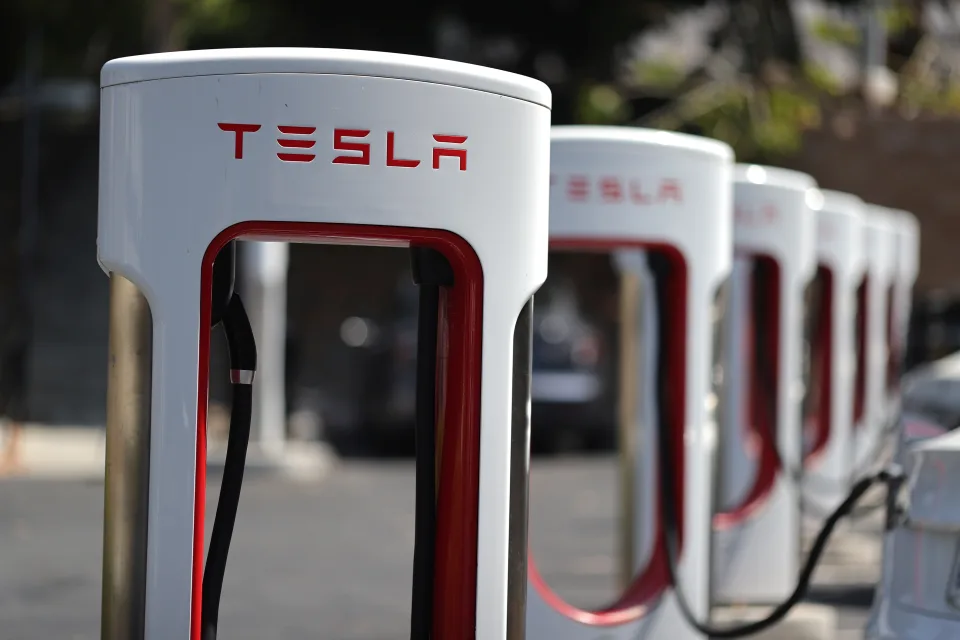
The Biden administration unveiled a new set of measures Wednesday designed to tackle a persistent problem with driving long distances in an electric vehicle (EV): finding a charging station that works for your car’s model.
The plan announced Wednesday, officials hope, will gradually do away with the issue by building out a network of both government and private chargers that work with any EV.
This announcement also includes commitments from companies like Tesla (TSLA), General Motors (GM), and others to build their own interoperable charging stations that would complement the government’s system.
“These new standards will make it so that you can charge your EV along major highways as easy as you can fill up for gas — no matter what kind of car you drive or what state you’re in,” said White House Infrastructure Coordinator Mitch Landrieu.
During a call with reporters Tuesday to preview the announcement, Landrieu added that the deal with Tesla and others was initiated during a virtual April 2022 meeting attended by EV CEOs.
“Elon Musk was on that call,” Landrieu said. “He was very open, he was very constructive, and, at that time, he said his intent was to work with us to make his network interoperable.”
Since then, Tesla is committing to building a network of at least 7,500 chargers that, the White House promises, will be open for use by all EV drivers by the end of 2024. Tesla and other companies have the option of retrofitting existing chargers to comply with the interoperability standards as well.
In addition to Tesla, a host of other companies are announcing plans this week, according to the White House. Hertz and BP are building a network of interoperable stations largely centered on airports. Another partnership is between Pilot Company, General Motors, and EVgo for another network of private, fast chargers set to be located at existing Pilot and Flying J roadside stops.
Other smaller private commitments announced by the White House Wednesday came from companies like TravelCenters of America, Mercedes-Benz, Volvo, and Starbucks.
Some of the companies assure that the first chargers will come online this year, while Biden officials promise the final experience will be user friendly and “eliminate the current practice of loading up your iPhone with 30 different apps, depending on where you pull up to charge.”
A goal of 500,000 electric vehicle chargers by 2030
EV charging infrastructure has long been a pain point with Mazda USA CEO and President Jeff Guyton, who recently told Yahoo Finance Live the infrastructure is “not really mature yet, so we think that the customer experience right now suffers a bit.”
The administration’s actions are designed to create a more convenient and reliable charging network, officials said. That way, as President Biden likes to say, “the great American road trip will be fully electrified.”
The standards mean that the new charging stations would have consistent plug types, power levels, and a minimum number of stations capable of fast charging to get cars back on the road quickly — a crucial detail for road trippers.
Other initiatives announced Wednesday included new rules that government-purchased EV chargers must be built in the U.S., new money for research into EV charging reliability, money for planning projects around the trucking sector, and more.
Almost a year ago, the administration announced another EV charging strategy focused on adding chargers along the existing interstate highway system less than 50 miles apart in most instances. Biden officials said this week that plans from all 50 states as well as Washington, D.C., and Puerto Rico have been approved with construction underway soon.
Overall, President Biden has pledged that the government will oversee a national network of 500,000 electric vehicle chargers by 2030. The goal was set as part of the 2021 bipartisan infrastructure law, which put $7.5 billion towards the EV charging efforts.
Biden also aims to have at least 50% of vehicle sales be electric by 2030. Both goals, officials said, remain well within reach.
“We’re well on our way, we got to keep our foot on the accelerator,” Energy Secretary Jennifer Granholm said this week.